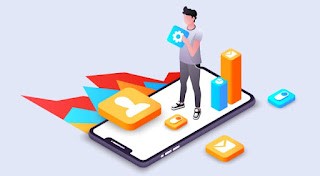Mobile App Development Process
Mobile App Development Process
Mobile app development is a subgenre of software development that focuses on apps that run on mobile devices.
Apps for various operating systems, such as iOS and Android, are developed.
Apps provide a better user experience than mobile web browsing because they take advantage of the built-in functionality of smartphones.
Over 78 percent of individuals in the world own a smartphone.
What do people do with these gadgets?
They use applications.
These apps are divided into a variety of categories, including gaming, music, calendars, communication, and more.
You're probably familiar with some of the most popular apps in the world, such as WhatsApp, Spotify, HeadSpace, Facebook, and Instagram.
Developing an app is a smart business move.
But first, you must comprehend the situation.
- Development
After you've finalized the design, you can start working on the actual product and begin the app development process.
In this step, you must choose a tech stack for your program (MEAN, MERN, etc.) and specify development milestones.
Following these guidelines when creating an app will assure its dependability and customer happiness.
- Market Research
After you've decided your concept, you should research similar apps that already exist.
It's uncommon to come across a whole fresh concept with no competitors.
Who are your main rivals?
What kind of audience are you trying to reach?
What is your approach for differentiating yourself from the competition?
What is the ideal platform for your app's launch?
How will you publicize and sell your app?
Market research is a crucial phase that you cannot afford to miss or shortcut.
You don't want to waste time and money developing a concept just to discover that no one wants it.
So getting this straightened properly before you start building anything might save you a lot of money.
- Build your app marketing strategy and pre-launch buzz
The planning to advertise and magnify your app, including branding, PR, pre-launch overall work, outreach, and simply web presence, is one of the most important factors in its success.
You might believe it's too early to start thinking about app marketing before you've even started developing your app.
However, if you start building buzz about your app before it hits the app stores, your efforts will pay off in the long term.
Now is a good time to get started with the following:
Define your personal brand.
What distinguishes your name, colors, logo, and content tone from the millions of other apps and businesses? Ensure consistency of all these across your app and all platforms you exist on.
- Planning and Analysis
The planning and analysis phase is an excellent place to start when defining your app.
Create a product roadmap to prioritize and divide your app requirements into milestones to begin the planning and analysis phase.
Our quality assurance teams are active in this phase to ensure that we fully comprehend your requirements and begin building test cases for your project.
- Quality Assurance (testing)
Any app's success depends on the quality of its software.
Your teams will uncover faults and issues before your consumers do, and they will be repaired in a timely manner if your software has been thoroughly tested.
Every consumer wants a well-designed, high-quality app that does not frequently hang and crash.
The following are mandatory testing regimens for your team:
Functional testing: This sort of testing ensures all of your app's features and functions work properly.
Platform testing: The rising number of devices in the mobile market necessitates testing your software across all main hardware platforms.
Consider popular versions and competition devices if your target audience predominates brand A and screen size Phones.
Testing for effectiveness
READ ARTICLES:
- mind-hacking-your-way-to-self
- make-money-with-affiliate-marketing
- blogsp0thealth
- the-5-unmissable-museums-to-visit
- blackpinks-hylt-move-hone-video-comes
After you've finalized the design, you can start working on the actual product and begin the app development process.
In this step, you must choose a tech stack for your program (MEAN, MERN, etc.) and specify development milestones.
Following these guidelines when creating an app will assure its dependability and customer happiness.
After you've decided your concept, you should research similar apps that already exist.
It's uncommon to come across a whole fresh concept with no competitors.
Who are your main rivals?
What kind of audience are you trying to reach?
What is your approach for differentiating yourself from the competition?
What is the ideal platform for your app's launch?
How will you publicize and sell your app?
Market research is a crucial phase that you cannot afford to miss or shortcut.
You don't want to waste time and money developing a concept just to discover that no one wants it.
So getting this straightened properly before you start building anything might save you a lot of money.
The planning to advertise and magnify your app, including branding, PR, pre-launch overall work, outreach, and simply web presence, is one of the most important factors in its success.
You might believe it's too early to start thinking about app marketing before you've even started developing your app.
However, if you start building buzz about your app before it hits the app stores, your efforts will pay off in the long term.
Now is a good time to get started with the following:
Define your personal brand.
What distinguishes your name, colors, logo, and content tone from the millions of other apps and businesses? Ensure consistency of all these across your app and all platforms you exist on.
The planning and analysis phase is an excellent place to start when defining your app.
Create a product roadmap to prioritize and divide your app requirements into milestones to begin the planning and analysis phase.
Our quality assurance teams are active in this phase to ensure that we fully comprehend your requirements and begin building test cases for your project.
Any app's success depends on the quality of its software.
Your teams will uncover faults and issues before your consumers do, and they will be repaired in a timely manner if your software has been thoroughly tested.
Every consumer wants a well-designed, high-quality app that does not frequently hang and crash.
The following are mandatory testing regimens for your team:
Functional testing: This sort of testing ensures all of your app's features and functions work properly.
Platform testing: The rising number of devices in the mobile market necessitates testing your software across all main hardware platforms.
Consider popular versions and competition devices if your target audience predominates brand A and screen size Phones.
Testing for effectiveness
READ ARTICLES:








Nhận xét
Đăng nhận xét